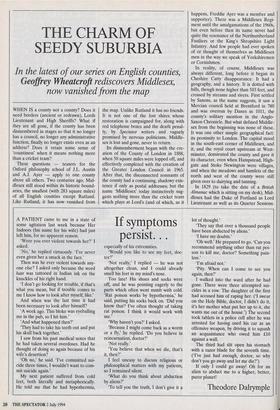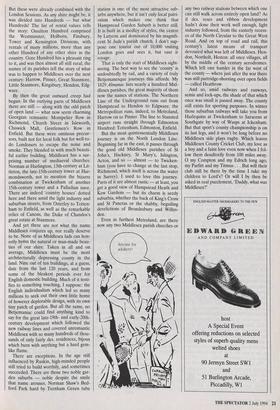through
Alastair Forbes
MARINA: THE STORY OF A PRINCESS by Sophia Watson Weidenfeld & Nicolson, £19.99, pp. 255
1•11■1■1[MMMI_
publisher, Cass Canfield, and later married, as his first wife, Jack Kennedy's pretty sister-in-law Lee, who in the words of her sister Jackie, who knew what she was talk- ing about, 'just needed lots more money'.
The Duke of Windsor had recognised the family likeness immediately when he met him at the table of Laura (née Char- teris, later Long, later Dudley, later Marl- borough), his second wife. So had the postman, who spotted the bronze head Laura had commissioned of her delightful third husband lying in the grass by the front door prior to being placed on a plinth. `Cor, blimey, His late Majesty', he exclaimed, confirming the 'our little Royal baby', as Michael had once heard his Nanny call him.
The finest post-World War I hours in the Duke of Windsor's life were those he spent cold-turkeying his youngest brother out of the cocaine habit Michael's mother had given him. But the grateful younger man could never support his brother David's abominable treatment of his mistress of long years, Freda Dudley Ward, whom Georgie continued to see regularly until the end of his life. 'If I told him to take off all his clothes and stand in the middle of Piccadilly Circus, he would have done it', Freda once said to me. As for Wallis Simp- son, she had other humiliations in store for him, which he bore with a mixture of masochistic pleasure and misery. approaching visit, will be far too tactful to remind Queen Elizabeth the Queen Moth- er of the time she panic-strickenly struck one of the few black hands allowed near her, trying to give her not a bomb but a bunch of flowers, during her pre-war visit to South Africa. But the Prime Minister of Ghana danced with Princess Marina at his country's independence celebrations, as one of this book's pictures shows. Sadly there are no reproductions of the Princess's pastel portraits, of which she did, alas, all too few, with a talent her father — Nicholas le Prince, in his Paris days, selling paintings to help his poor fam- ily — would have been proud of. As for the author's speculations about Danny Kaye, whom Marina first met at a party given by the Sachie Sitwells in Loelia Westminster's Grosvenor Square flat, I recall that she persuaded me to drive her and her hus- band's former fiancée, Poppy Baring, from it with Kaye to the 400. Ve crois qu'il est un
Robert Oakeshott
ARGUING REVOLUTION: THE INTELLECTUAL LEFT IN POSTWAR FRANCE by Sunil Khilnani Yale, £19.95, pp. 264
Thus pissed Zarathustra [TPZ]
The epigraph is not a hostile character- isation of the work of Jean-Paul Sartre, the French writer and philosopher, who, alongside the hapless uxoricide Louis Althusser, is the chief representative of France's post-war intellectual left studied in this book. Instead it was evidently one of Sartre's own favourite jests in his younger, student days. I found it in a more or less authorised biography written by John Garassi, who was apparently the great man's godson. The passage in which it is embedded, and in which Sartre him- self is the speaker, is well worth rescuing:
While I was fundamentally a pacifist, I did not shirk from violence to express my dis- dain for my fellow students who wanted to belong to the bourgeois system. For example there was one idiot we called 'The Niet- zchean' who used to claim that the sufferings of the lower classes helped them to develop. So when he came back early in the morning . . . all dolled up in a smoking [sic] we would await him on the roof and drop bal- loons full of, well, er, water or worse on him and yell `TPZ'.
That stated pacificism can co-habit with surprisingly high levels of personal aggres- peu epris de moi', I heard her mutter, only to be deafened by Poppy's 'Balls!'
In a bare convent room in the Paris suburbs, adorned with a crucifix, there has lingered for long years in and out, but mostly out, of her mind and memory Princess Marina's once beautiful eldest sis- ter, Olga. Hers has been the lot her youngest sister happily avoided. Marina slipped away into coma and death before dreaded incapacity. Two days earlier, though aware of her fatal condition, I had telephoned her to ask her for her sister's number in Florence. There was a long pause, a 'Damn' and a bump as she fetched it from another room, helpful and kind to the last. She was a great lady. She was an exemplary princess and friend, and Sophia Watson is right to add, 'Were more of the royal family to have been like Marina, there would have been infinitely less trouble for the monarchy.' Hear, Hear.
Need we take Sartre seriously?
column inches were devoted to assessments of his life and work than had been the case on the death of de Gaulle some years before. The then President, Giscard d'Estaing, sent a presidential message of condolence, though I am not clear to whom. And half a million people, the sort of numbers that greeted the Pope in Poland in the 1980s, followed the coffin at his funeral.
Second, Mr Khilnani has an important tale to tell which is rather at a tangent to his discussion of Sartre and Althusser. He takes his readers through the long process by which, starting from the early 1970s and under the leadership of the historian Francois Furet, the formerly dominant Marxist interpretation of the French Revolution — which stressed as pivotal the role of the Jacobins and the terror — has been swept away, and been replaced by what is essentially a benign and democratic interpretation. For the service of making an account of this enormous shift accessi- ble to British readers, Mr Khilnani, who was born in New Delhi and now teaches politics at Birkbeck, deserves high marks.



























































 Previous page
Previous page